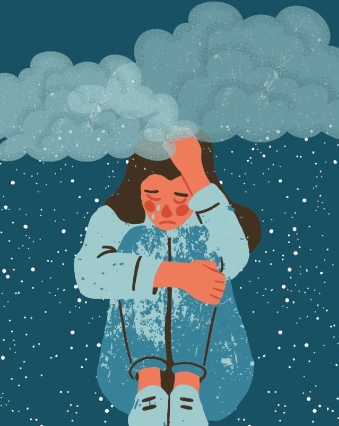
With the winter months soon approaching, so are the sad feelings associated with this time of year. Seasonal Affective Disorder, or SAD, is a type of depression brought on by the lack of sunlight during the fall and winter seasons. The shorter days and lack of sunlight are known to be a catalyst for a chemical change in the brain that leads to depression. There are two types of SAD, fall-onset and spring-onset. Fall-onset depression symptoms begin in late fall to early winter. This is the most common type. Spring-onset depression symptoms begin in late spring to early summer. This type is not as common.
Symptoms vary depending on which type of SAD you have. Fall-onset symptoms are oversleeping, overeating, and social withdrawal are common. In contrast, spring-onset symptoms include insomnia, poor appetite, agitation, and anxiety are common. Both types share symptoms of depression, mood swings, and loneliness. These symptoms could also be signs of general depression, as SAD is distinct from general depression due to the period in which these symptoms appear.
This disorder has some interesting treatments. Light therapy is a widespread way to combat SAD. The light acts as a substitute for natural light which raises serotonin levels, making you happier and calmer. Using a lightbox for 30 minutes every morning has been proven to be successful in lessening symptoms. In addition to artificial light, going outside and soaking up natural light is very effective. Traditional talk therapy with a licensed professional is also a great way to get out emotions related to SAD. SSRIs, or selective serotonin reuptake inhibitors, and antidepressants have been shown to reduce depressed feelings as well by changing how the brain makes or uses chemicals involved in stress or emotion. Some say vitamin D can also help, however, there is not much scientific evidence to prove so.
The winter months are often burdensome for some because of Seasonal Depression, so remember to be aware and conscientious of others. Offering support to those struggling can go a long way for some and be extremely helpful. You never know what someone is going through, so being kind to everyone is essential.
Sources:
https://www.hopkinsmedicine.org/health/conditions-and-diseases/seasonal-affective-disorder

